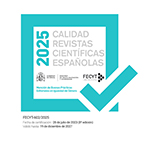La influencia de los programas de televisión sensacionalistas en el panorama europeo: estudio de caso en España e Italia
Resumen
La diversidad de los nuevos formatos audiovisuales ha provocado que las grandes empresas mediáticas se encuentren en constante competencia. Los programas televisivos de carácter sensacionalista, específicamente, los programas de «corazón» ocupan un papel importante en el panorama informativo actual. Esta investigación tiene como objetivo analizar los hábitos de la audiencia de los programas de carácter sensacionalista, así como examinar los perfiles individuales y las perspectivas de éstos en España e Italia, concretamente en las provincias de Huelva y Turín. Como método de análisis cualitativo se han realizado un total de 24 entrevistas en profundidad (12 en España y 12 en Italia), validadas por expertos en la materia. Las conclusiones extraídas confirman la falta de alfabetización mediática de los espectadores y además, se hace patente el constante interés por la búsqueda del entretenimiento, a pesar de negar el visionado de los contenidos. En definitiva, la educación en medios se erige como asignatura necesaria para la conformación de una correcta actitud crítica.Descargas
Descarga artículo
Licencia
La revista Estudios sobre el Mensaje Periodístico, para fomentar el intercambio global del conocimiento, facilita el acceso sin restricciones a sus contenidos desde el momento de su publicación en la presente edición electrónica, y por eso es una revista de acceso abierto. Los originales publicados en esta revista son propiedad de la Universidad Complutense de Madrid y es obligatorio citar su procedencia en cualquier reproducción total o parcial. Todos los contenidos se distribuyen bajo una licencia de uso y distribución Creative Commons Reconocimiento 4.0 (CC BY 4.0). Esta circunstancia ha de hacerse constar expresamente de esta forma cuando sea necesario. Puede consultar la versión informativa y el texto legal de la licencia.










